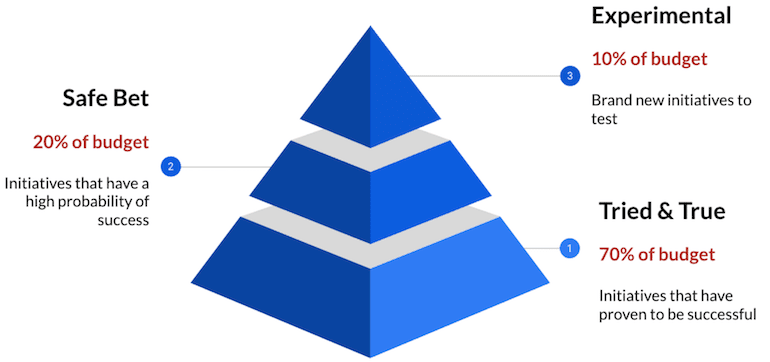70/20/10 PPC Budgeting

Budgeting for clients is an uphill battle. It is also a challenge deciding how you want to spend your client’s budget, how to figure out the amount to allocate towards a certain platform, and then to develop a reasoning for your recommendation. There’s a method that I have fallen back on, that many at Hanapin utilize for their accounts. It is the 70/20/10 budgeting rule. This is a formula that may not work for clients, so do not take this as a hard fast budgeting rule; it is just a guideline to help account managers get started budgeting for a new fiscal year.
I have been fortunate to have solid relationships with my clients. We’ve been working together for a while and there is trust built between us. When a client comes to an account manager with a yearly or quarterly budget and asks, “How should we spend it?” I look at that as a very positive sign. The client wants your recommendations on how to spend their money! Sure, this is business, but do you ask anyone how you should spend your money? No.
When your client asks you that question, don’t freeze up. Below is a process to help you get started on budgeting for your client with defined reasons as to why you allocate money a certain way.

70%
This is the easiest amount of budget to allocate. 70% of your total budget should go toward tactics that you are always running (sometimes deemed your “Evergreen Campaigns”). These are your tried and true efforts that are top conversion drivers for you. You do not want to move any budget away from these tactics, or else your performance will drastically decrease. Having the majority of your budget goes towards what you know and you have proven will work will give your client some ease in moving forward with your other recommendations on how to allocate money.
Even if you and your client know what your Evergreen Campaigns consist of, lay out what they are and lay out the KPIs. It is important, especially during budgeting season, that every dollar has a name to it and every dollar has an expected result to it too.
20%
20% of your budget should go towards opportunities you have good reason to believe that they will work. They are likely low funnel expansion opportunities that will drive sales or conversions or leads. Examples of this would be: expanding into Facebook, expanding search campaigns, testing new ad types, programmatic expansion, or testing a YouTube for action campaign. (Depending on the client, a YouTube for action campaign may be under the “10%” of your budget rather than the “20%”). These initiatives are still conversion drivers, but they are driving your account strategy forward into new territories.
Like the 70%, lay out the specific tactics and campaigns you plan to expand into. Lay out what deliverables are needed from the client’s side and from your side. Furthermore, lay out a timeline; this will show your client that you have thought through the expansion and shows that you are serious about it.
10%
I think this is the fun portion. 10% of your budget should be allocated to completely new ideas. This is your testing budget. There are next to no expectations on this portion of spend, but again, you are bringing new ideas to your client and you are driving your strategy forward. Examples of testing in 10% would be: Pinterest, display advertising, a brand awareness study, or a YouTube campaign (depending on the type of client you have). When I say there are next to no expectations, that doesn’t mean you don’t outline how you will measure the success of whatever you are testing to your client. You must do so. And the clearer and more detailed you are about defining how you will measure success on your test, the more likely your client will have confidence in the testing budget.
Come to the table with a defined way to spend your client’s money. Layout specific tactics set expectations, and define deliverables for each. I think that most any client will be impressed with your results in doing so.
For additional budgeting ideas and resources for your clients this year, check out Hanapin’s webinar, How to Allocate Your Budget Wisely for 2019.




